Introduction
Pressure washers are invaluable tools for homeowners that can be used to eliminate tough grime, mildew, and dirt from decks, sidewalks, cars, or fences. However, water force alone does not make them successful at cleaning; it is the detergent that they apply to the surfaces too.
This comprehensive guide will teach you how to create your own Homemade Diy Pressure Washer Soap/Detergent from scratch. We give details about various types of cleaning solutions as well as environmentally friendly tips on their usage and storage facilities.
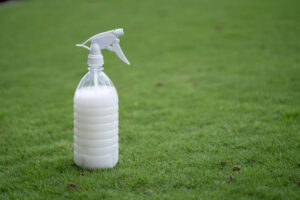
If you are an experienced do-it-yourselfer looking forward to reducing their carbon footprint or just someone who loves household tricks, then this is the right place.
Understanding Pressure Washer Detergent / Soaps
Before we start working, it is necessary to know what we are dealing with. Different Pressure Washer Detergent / Soaps have different applications depending on particular tasks or surfaces to be cleaned.
Others are specifically meant only for vehicles, while some deal with getting rid of mildew, while others can act as all-purpose cleaners. When formulating your homemade recipe, think about the surface’s texture being cleaned and your desired characteristics for a detergent.
Types of Pressure Washer Detergent / Soaps
Commonly available commercial Pressure Washer Detergent / Soaps usually fit into three categories:
- Heavy-duty degreasers: They are most effective against greasy areas like driveways or engines.
- Light-duty cleaners: These can be used for general cleanings or delicate matters.
- Multi-purpose washes strike a balance between heavy-duty degreasers and light-duty cleaners, which remove light dirt from many surfaces.
Can You Run a Pressure Washer Without Water?
The Importance of Using the Right Detergent for Different Surfaces
If the wrong detergents are used, either surfaces can get damaged or the cleaning will be ineffective. For example, a heavy-duty degreaser designed for concrete may strip paint from a vehicle. Therefore, ensure that you read instructions and understand what you put on what surface.
Safety Precautions While Handling Detergents
Some DIY homemade Pressure Washer Detergent / Soaps or soaps are very harsh to the skin and can produce fumes, especially when heated by the sun. Thus, handle them with care and with proper ventilation.
Ingredients for Homemade Pressure Washer Detergent / Soap
Alternatively, making your own detergent can be quite easy because it calls for just a few basic items, which are usually readily available in one’s house, meaning that you know exactly what is contained in your cleaning solution.
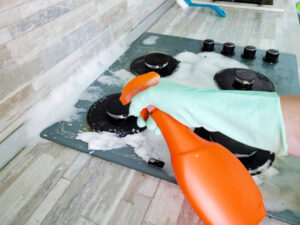
woman in protective gloves holds a gas stove cleaner made of tempered glass.
Base Ingredients
For instance, surfactants or soaps are crucial in formulating homemade detergents. These agents help dislodge dirt from various surfaces. Below is a list of base ingredients:
Soap or surfactant
Objective: Cleaning and removing dirt and grime through the breakdown of water tension.
For surfactants, you can use:
- Liquid castile soap
- Dish soap (make sure it is not antibacterial or concentrated).
- Laundry detergent (no bleach)
Water Softener (Optional)
Purpose: Improving efficiency by avoiding binding between mineral ions present in hard water.
These are:
- Borax or washing soda
- Water conditioner
Enhancing Ingredients
On an individual basis, there are also some additional enhancers to include in your detergent for customized cleaning purposes. The most common ones include:
Degreasing Agent
Purpose: Get rid of tough grease and oil stains.
Recommended agents:
- Baking soda
- Oxygen bleach
- Lye
Scent Enhancers
Purpose: To add a pleasant fragrance.
Try:
- Essential oils (lavender, lemon, and eucalyptus)
- Scented liquid soaps
Stain Removers
Purpose: To handle stains or discoloration.
Consider:
- White vinegar (especially for mineral deposits)
- Oxalic acid for rust
Eco-Friendly Alternatives and Their Benefits
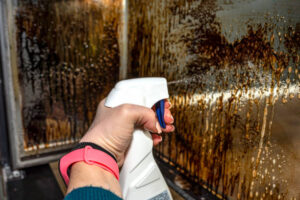
Health and the environment will profit from green detergents. They may be utilized in every household and are very powerful cleansers.
Equipment and preparation
What you will need for your homemade detergent project is the basic stuff that you already have in the kitchen. This is what you require:
Required Equipment
- A large mixing container
- Measuring tools (cups, spoons, or a scale)
- Stirring utensil (spoon or whisk)
Safety Gear
- Gloves should be worn to protect against concentrated solutions.
- Goggles should be worn to prevent splashes from going into the eyes.
- A mask should be worn if using stronger ingredients to guard against fumes.
Preparing the Workspace for Making Detergent
It is advisable that, before you begin blending, you choose a well-ventilated space outside or a garage with open doors, as this will minimize exposure to strong smells and fumes.
Step-by-Step Guide to Making Homemade Pressure Washer Detergent / Soap
After all preps have been done, it’s about time your cleaning potion came out of its cocoon! Here’s how we do it:!
Mixing the base ingredients
- You start with soap or surfactant. Depending on concentration, one can use 1 part soap to five parts water. For example, if dish detergent requires 1:20, then multiply one cup of dish soap by twenty cups of water.
- If including softeners in the water, add at least one teaspoon per quart (or more, depending on strength) of your soap solution.
- The components are mixed slowly until they blend well together.
Adding Enhancing Ingredients for Specific Cleaning Purposes
Here, you can be creative and match what you are cleaning. Here’s how to add more elements of specialization:
- For degreasers, add a quarter cup of bicarbonate soda or a tablespoon of oxygen bleach per gallon of your base solution.
- If you want scented additives, just put a few drops of essential oils, and this is adequate since they are so strong. Start with a small amount.
- Stain removers like vinegar can be added at the same ratio as your base soap solution—about a cup for every gallon.
Ensuring Proper Dilution Ratios for Effective Cleaning
Homemade detergents need to be diluted properly. Always refer to your pressure washer’s manual for guidance on the recommended dilution ratios for the type of detergent you’ve made.
Testing the detergent on a small area before full application
It would be wise if you tried out your detergent first. Apply a small amount to an invisible area or any other less noticeable spot to make sure that it does not cause any damage or discoloration at all.
Tips for Effective Use and Storage
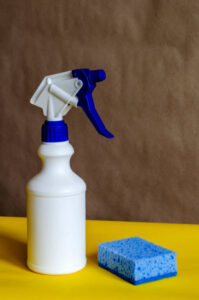
White plastic bottle with spray and sponge on a two-color background. White bottle with blue cork and trigger. Accessories for cleaning and washing. Side view. Close-up.
After mixing up your homemade detergent, there are a couple of things that one should keep in mind when using and storing it.
Proper Application Techniques for Different Surfaces
Different surfaces have different techniques. Always begin from the lowest settings; if necessary, increase from there. Keep sweeping motions and stay within two to three feet away from the surface throughout.
Guidelines for Diluting Detergent Based on Pressure Washer Specifications
Again, always follow the manufacturer’s guidelines for detergent dilution. This is important because it ensures that the pressure washer is not damaged when cleaning or damage to its surface happens.
Storing homemade detergent safely and securely
Avoid direct sunlight, and store homemade detergent in a cool, dry place. Check that it is also kept away from children and pets by putting labels on it and ensuring that it cannot be easily opened.
Shelf life and expiration considerations
Homemade detergents usually last about a few months, depending on their composition and the method of keeping them. As time goes by, detergent performance can decrease or the mixture can stratify, and therefore it is advisable to produce smaller quantities that are used within a season.
Safety Precautions and Environmental Impact
Homemade laundry detergent has other benefits beyond cost and convenience; safety for you as well as the environment is important.
Handling and Storage Precautions to Prevent Accidents
All cleaning solutions should be out of reach of children and pets, whether you have made them yourself or bought them from the shelf. Accidents occur rapidly, so one should take great caution. Additionally, your homemade detergent needs to be labeled correctly in order not to confuse users because accidents do happen quickly.
Proper Disposal Methods for Leftover Detergent
Therefore, any leftover soap should be properly discarded if it is not used. Consult the local waste management facility on how best to throw away soapy water or other ingredients safely, thus reducing the environmental impact.
Environmental Benefits of Using Homemade and Eco-Friendly Detergents
This is because homemade laundry detergents contain fewer harmful chemicals compared to commercial detergents with which they compete. By going green with these alternative versions thereof, your family will be safe while contributing towards a cleaner world altogether.
Conclusion
A homemade Pressure Washer Detergent / Soap or soap can save the environment and make you feel powerful. You are given many options to determine what you want to use in your house, and this in turn brings a personalized approach to the cleaning process.
With such directions being followed as provided in a detailed guide, one ends up having cleaner surfaces than he or she has managed from the start till the end.
We ask you to try out different combinations out there and let people know how it goes with those who enjoy doing it yourself. It is an easy way to lessen your carbon footprint as well as save money while making sure everything is sparkling clean through your own innovation.
Explore homemade Pressure Washer Detergent / Soaps and experience the rewarding mix of efficiency and eco-friendliness that comes with this DIY activity.
FAQs (Frequently Asked Questions)
Q: Can I use my own detergent in a pressure washer on any surface?
Ans: Even though homemade soaps are normally safe to use on many surfaces, it is important that before you start using them, you try the solution on a small part that is not visible since it may be incompatible with some materials. Take care when washing delicate surfaces such as glass or polished metals, and avoid using abrasive materials on them.
Q: Are self-made soaps for pressure washers good, like those bought from shops?
Ans: When done correctly and with the right ingredients, homemade detergents can be just as effective as store-bought ones. However, their efficiency might depend on the materials used and the kind of cleaning contemplated.
Q: Is there a possibility that homemade power washer detergent can be adjusted to other cleaning needs?
Ans: Yes, one of the major benefits of creating your own liquid soap for washing is tailoring its components so that they fit what you need. That is like stain remover for grease spots or dirt spots according to certain amounts or proportions of ingredients once more, which you would like to remove after not having been removed.
Q: Do DIY power washer detergents conform to environmental standards?
Ans: Homemade detergents are typically green, especially when you go for organic items instead of harsh chemicals. Consider biodegradable options, which do less damage, and properly dispose of them.
Q: How long will my homemade pressure washing concentrate last?
Ans: The shelf life varies depending on how it is stored and what ingredients go into making the detergent at home. In general, it is recommended that you use up your mixture within a few months for the best results. Keep it in a dark, dry room or any other storage place where no direct sunlight reaches for a longer shelf life.
Q: What is the best homemade pressure-washing solution?
Ans: The most effective homemade power washer soap consists primarily of liquid dishwashing detergent, white vinegar, baking soda, and water. It gently breaks down all types of dirtiness.
Q: What can you use instead of Pressure Washer Detergent / Soap?
Ans: Instead of having a high-pressure cleaner, upon which we apply some detergent, there are homemade solutions that you can employ for the same purposes. For example, you can mix water with liquid dish soap or vinegar in a water solution or dissolve baking soda in water instead of using commercial detergents.
Q: What chemical do you use for pressure washing?
Ans: Commonly used power wash chemicals include detergents for pressure washers specifically formulated to remove things like grease, mildew, and mold, some of which come in concentrates. In addition, biodegradable soaps have gradually gained popularity as an alternative to these.
Q: What is a natural cleaner for power washing?
Ans: Natural cleaners for pressure washing usually consist of ingredients like white vinegar, baking soda, or citrus-based solutions. These natural cleaners are stronger than harsh chemicals, which makes them better choices for the environment and surfaces.
Q: What is the best acid for pressure washing?
Ans: Whenever employing acids while doing high-pressure cleaning, the utmost caution needs to be taken, following safety precautions. Common acids used in this process include diluted forms of muriatic acid (hydrochloric acid), citric acid, or oxalic acid.
However, one must handle them with caution and only when necessary because they could corrode surfaces and pose a health risk to people or the surroundings.
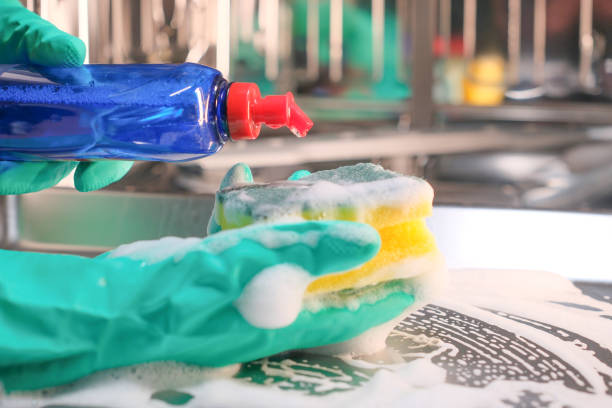








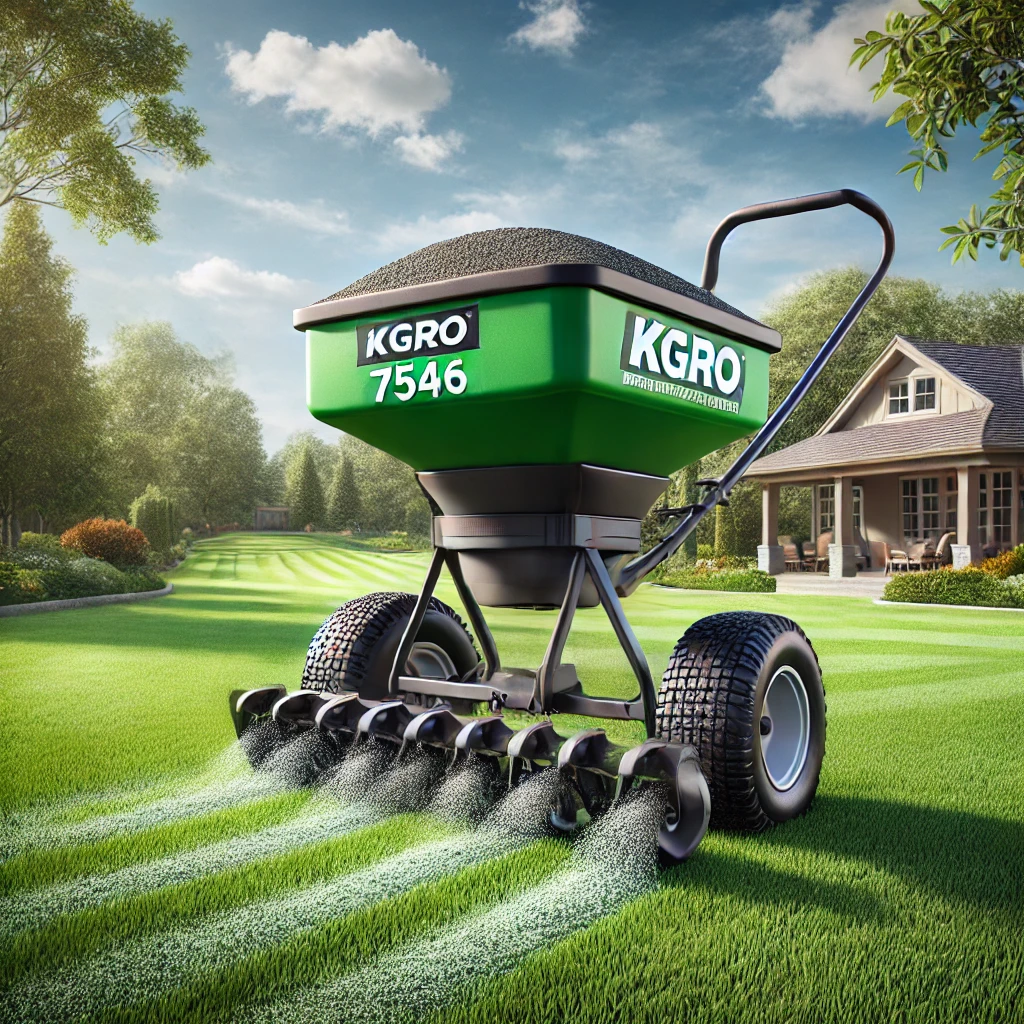

Leave a Reply